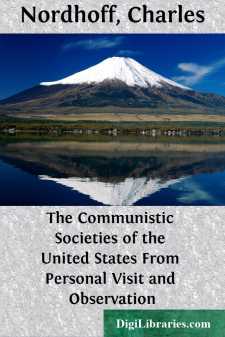Categories
- Antiques & Collectibles 13
- Architecture 36
- Art 48
- Bibles 22
- Biography & Autobiography 813
- Body, Mind & Spirit 142
- Business & Economics 28
- Children's Books 17
- Children's Fiction 14
- Computers 4
- Cooking 94
- Crafts & Hobbies 4
- Drama 346
- Education 46
- Family & Relationships 57
- Fiction 11829
- Games 19
- Gardening 17
- Health & Fitness 34
- History 1377
- House & Home 1
- Humor 147
- Juvenile Fiction 1873
- Juvenile Nonfiction 202
- Language Arts & Disciplines 88
- Law 16
- Literary Collections 686
- Literary Criticism 179
- Mathematics 13
- Medical 41
- Music 40
- Nature 179
- Non-Classifiable 1768
- Performing Arts 7
- Periodicals 1453
- Philosophy 64
- Photography 2
- Poetry 896
- Political Science 203
- Psychology 42
- Reference 154
- Religion 513
- Science 126
- Self-Help 84
- Social Science 81
- Sports & Recreation 34
- Study Aids 3
- Technology & Engineering 59
- Transportation 23
- Travel 463
- True Crime 29
The Communistic Societies of the United States From Personal Visit and Observation
by: Charles Nordhoff
Categories:
Description:
Excerpt
INTRODUCTION
Though it is probable that for a long time to come the mass of mankind in civilized countries will find it both necessary and advantageous to labor for wages, and to accept the condition of hired laborers (or, as it has absurdly become the fashion to say, employees), every thoughtful and kind-hearted person must regard with interest any device or plan which promises to enable at least the more intelligent, enterprising, and determined part of those who are not capitalists to become such, and to cease to labor for hire.
Nor can any one doubt the great importance, both to the security of the capitalists, and to the intelligence and happiness of the non-capitalists (if I may use so awkward a word), of increasing the number of avenues to independence for the latter. For the character and conduct of our own population in the United States show conclusively that nothing so stimulates intelligence in the poor, and at the same time nothing so well enables them to bear the inconveniences of their lot, as a reasonable prospect that with industry and economy they may raise themselves out of the condition of hired laborers into that of independent employers of their own labor. Take away entirely the grounds of such a hope, and a great mass of our poorer people would gradually sink into stupidity, and a blind discontent which education would only increase, until they became a danger to the state; for the greater their intelligence, the greater would be the dissatisfaction with their situation—just as we see that the dissemination of education among the English agricultural laborers (by whom, of all classes in Christendom, independence is least to be hoped for), has lately aroused these sluggish beings to strikes and a struggle for a change in their condition.
Hitherto, in the United States, our cheap and fertile lands have acted as an important safety-valve for the enterprise and discontent of our non-capitalist population. Every hired workman knows that if he chooses to use economy and industry in his calling, he may without great or insurmountable difficulty establish himself in independence on the public lands; and, in fact, a large proportion of our most energetic and intelligent mechanics do constantly seek these lands, where with patient toil they master nature and adverse circumstances, often make fortunate and honorable careers, and at the worst leave their children in an improved condition of life. I do not doubt that the eagerness of some of our wisest public men for the acquisition of new territory has arisen from their conviction that this opening for the independence of laboring men was essential to the security of our future as a free and peaceful state. For, though not one in a hundred, or even one in a thousand of our poorer and so-called laboring class may choose to actually achieve independence by taking up and tilling a portion of the public lands, it is plain that the knowledge that any one may do so makes those who do not more contented with their lot, which they thus feel to be one of choice and not of compulsion....



